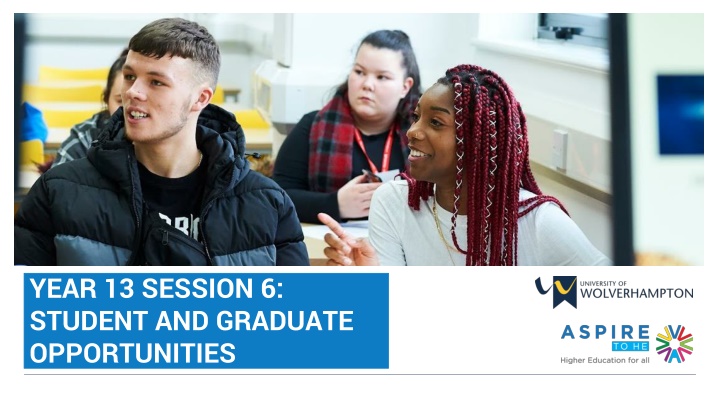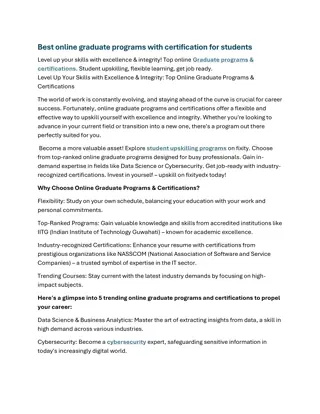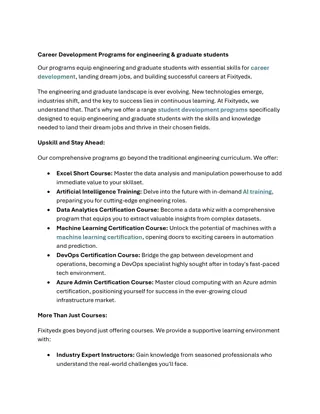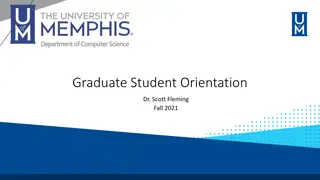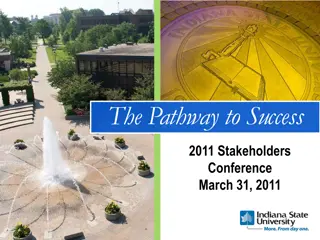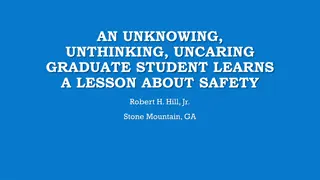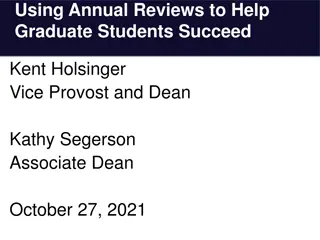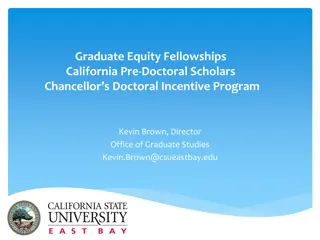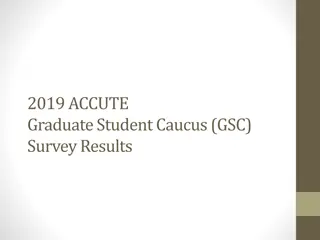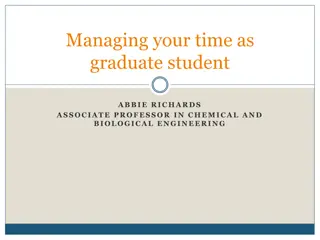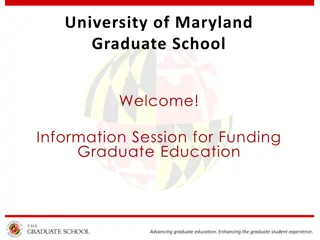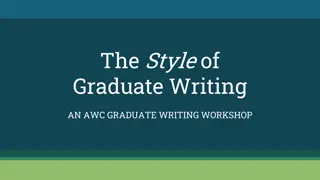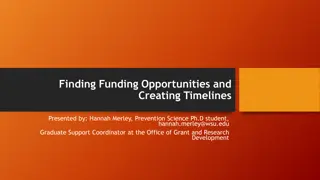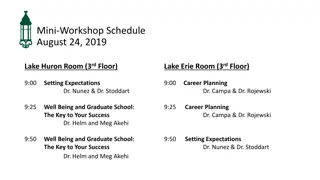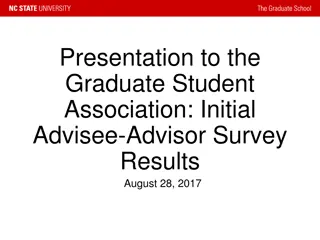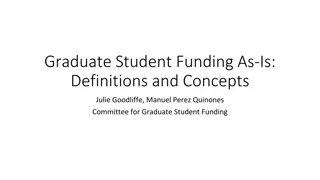Student and Graduate Opportunities for Future Success
Discover valuable insights on budgeting, maximizing finances, and navigating post-graduate paths. Learn about placement years, studying abroad, and graduate employability. Uncover the benefits of taking a placement year and the opportunities available before graduating. Plan your academic journey strategically with these essential tips and resources.
Download Presentation

Please find below an Image/Link to download the presentation.
The content on the website is provided AS IS for your information and personal use only. It may not be sold, licensed, or shared on other websites without obtaining consent from the author.If you encounter any issues during the download, it is possible that the publisher has removed the file from their server.
You are allowed to download the files provided on this website for personal or commercial use, subject to the condition that they are used lawfully. All files are the property of their respective owners.
The content on the website is provided AS IS for your information and personal use only. It may not be sold, licensed, or shared on other websites without obtaining consent from the author.
E N D
Presentation Transcript
YEAR 13 SESSION 6: STUDENT AND GRADUATE OPPORTUNITIES
PREVIOUS SESSION OBJECTIVES OBJECTIVE 1: To understand what budgeting is and how it can help you manage your finances whilst at University. OBJECTIVE 2: To understand how to make your money go further at University. OBJECTIVE 3: To make a start on your student finance application.
CHECK-IN Did you find any graduate job or study pathways available to you after you finish at university?
SESSION OBJECTIVES OBJECTIVE 1: To understand about placement years and studying abroad. OBJECTIVE 2: To understand graduate employability and discover graduate opportunities. OBJECTIVE 3: To understand postgraduate study options and professional training programs.
DID YOU KNOW? CAN YOU TAKE A WHOLE YEAR OUT OF YOUR UNIVERSITY DEGREE TO WORK FOR AN ORGANISATION? Answer = Yes you can! This is often called a placement year, a sandwich year or a year in industry.
DID YOU KNOW? CAN YOU TAKE A WHOLE YEAR OUT OF YOUR UNIVERSITY DEGREE TO GO ABROAD AND WORK OR STUDY? Answer = Yes you can! This is often called a year abroad. You usually spend a year abroad working, studying or a combination of both work and study.
OPPORTUNITIES AVAILABLE BEFORE YOU GRADUATE There are many ways you can gain skills & experience at university. Two great opportunities to do this are: placement year or a year abroad
PLACEMENT YEAR When can you do a Placement Year? A placement year is an opportunity to spend a year gaining valuable work experience during your time at university. Often you ll do a placement year after your 2nd year of study. This means if you re studying a 3 year course, it will become a 4 year course (3 years of study + your placement year): Year 1 = first year at university Year 2 = second year at university Year 3 = placement year Year 4 = final year at university
PLACEMENT YEAR Why would you do a placement year and what are the benefits? Get a feel for the job you might want to do after university (or the job you don t want to do!) A full year of work experience to gain vital employability skills Gain an insight into an industry or organisation Grow your professional network you may even be offered a graduate job at the end Earn a salary Increase your confidence
PLACEMENT YEAR https://www.youtube.com/watch?v=63OHM-bbRco&feature=emb_title
STUDYING ABROAD Why do students choose to study abroad? Stand out from the crowd Graduate employment is tough, it ll give you more life experience, cultural awareness, and perhaps a different perspective on life to your fellow graduates. Study at a top ranking course provider According to the QS World University Rankings, six of the top ten universities on the planet are abroad, with five of those being in America. Learn a new language Being able to speak another language will offer so many more job opportunities in sectors such as manufacturing, banking, finance and insurance Enhancing soft skills As well as growing academically, placements abroad will develop key soft skills, such as communication, problem solving and confidence.
DIFFERENT WAYS TO STUDY ABROAD Courses with a study abroad option: If you want a period abroad built into your undergraduate degree, choose a course that includes an additional compulsory full academic year abroad. Check with your university that your undergraduate course allows you to participate in a Study Abroad Programme An internship is a period of work experience, offered by an organisation, lasting for a fixed period of time anywhere between a week and 12 months. They are typically undertaken by students and graduates looking to gain relevant skills.
INTERNSHIPS ABROAD Australia Asia Internship Programme BUNAC (British Universities North America Club) Frontier The Intern Group Thailand Asia Internship Programme BUNAC The Intern Group
INTERNSHIPS ABROAD China Asia Internship Programme BUNAC ImmerQi The Intern Group USA/New York BUNAC City Internships The Intern Group
GRADUATE KNOWLEDGE QUIZ ON AVERAGE, HOW MUCH MORE DO GRADUATES EARN OVER THE COURSE OF THEIR CAREERS COMPARED TO NON-GRADUATES? Answer = 250,000 People with degree qualifications are likely to see career earnings 250,000 greater (on average) than those without. This is often referred to as the Graduate Premium! Students borrow a fraction of their potential career earnings when studying it s an investment into their future!
GRADUATE KNOWLEDGE QUIZ TRUE OR FALSE - YOU CAN ACCESS YOUR UNIVERSITY S CAREERS SERVICE AFTER YOU GRADUATE Answer = True Most universities allow their alumni to access their careers service for a few years after they graduate. So remember to check how long you ll be able to access your chosen university s career service!
GRADUATE KNOWLEDGE QUIZ WHAT IS THE DIFFERENCE BETWEEN A GRAD SCHEME AND A GRAD JOB? Answer: The differences between graduate schemes and graduate jobs can be quite subtle but they are important to recognise. Graduate schemes and graduate jobs both require degrees, but graduate schemes usually require a longer interview process than graduate jobs. Graduate jobs and graduate schemes are both aimed at high- calibre graduates and often include training and support, but are graduate jobs are often less structured than graduate schemes.
GRADUATE SCHEMES What is a Graduate Scheme? A graduate scheme is a structured training programme run by an employer to develop future leaders of their organisation. These graduate programmes, which usually last between one and two years (although they can be longer), are often available in a number of specialisms - ranging from finance, retail, HR and marketing, to management and law.
GRADUATE SCHEMES PROS AND CONS OF GRADUATE SCHEMES PROS CONS On-the-job training Highly competitive Support/mentoring Long interview process High earning potential Often an expectation to work longer hours Provides insight into various departments/areas
GRADUATE SCHEMES Where can you find them? Company websites Bright Network Prospects.ac.uk Save the student
GRADUATE SCHEME LOGO QUIZ How many companies do you think you know who offer graduate schemes? Can you guess the name of the company and what type of graduate scheme they offer?
GRADUATE SCHEME LOGO QUIZ Company: Lloyds Bank Types of graduate scheme: Data Science, Finance, Software Engineer, Retail Customers and Products Website: https://www.lloydsbankinggrouptalent.com/graduat es/our-graduate-schemes/
GRADUATE SCHEME LOGO QUIZ Company: Aldi Types of graduate scheme: Graduate Area Manager Website: https://www.aldirecruitment.co.uk/area- manager-programme/our-area-manager- programmes/graduate-area-manager-programme/
GRADUATE SCHEME LOGO QUIZ Company: Civil Service Types of graduate scheme: Commercial, Digital, Data and Technology, Diplomatic Service, Finance, Diplomatic Service Economics, Government Social Research, Human Resources, Houses of Parliament, Property, Science and Engineering, Project Delivery Website: https://www.faststream.gov.uk/
GRADUATE SCHEME LOGO QUIZ Company: NHS Types of graduate scheme: General Management, Health Analysis, Human Resources Management, Finance Management, Policy and Strategy Management, Health Informatics Management Website: https://www.nhsgraduates.co.uk/the- scheme/
GRADUATE SCHEME LOGO QUIZ Company: Royal Navy Types of graduate scheme: Organisational, Tactical, Technical, Medical. Website: https://www.royalnavy.mod.uk/careers/levels-of- entry/graduates
GRADUATE SCHEME LOGO QUIZ Company: Cancer Research Types of graduate scheme: Fundraising and Marketing, Finance, Policy, Information and Communications, Scientific Strategy and Funding, Technology, Human Resources. Website: https://www.cancerresearchuk.org/about- us/early-in-career-opportunities/about-our-scheme
GRADUATE JOB What is a Graduate Job? Graduate jobs are usually those that require someone to hold a degree to start their career in that profession. Some graduate degrees may require a specific degree, but many simply require a degree. These jobs are usually found on company/organisation websites, and more general job search websites. Graduate jobs do not usually have a set timeframe, unless stated. Graduate jobs are still aimed at motivated, high-calibre graduates and often include training and support, but are less structured than graduate schemes.
GRADUATE JOB PROS AND CONS OF GRADUATE JOBS PROS CONS There are more graduate jobs available than graduate schemes The interview process is usually less intense than graduate schemes You can apply for graduate jobs all year round Competitive Training is usually less lengthy and structured than graduate schemes The salary is often less competitive than graduate schemes Unless stated, you are not contracted into X amount of time at a company
POSTGRADUATE STUDY What is Postgraduate Study? Generally, a postgraduate degree is a degree that you can complete once you have finished your undergraduate studies. There are four main types of postgraduate degrees: o Taught courses o Research degrees o Conversion courses o Professional qualifications Many postgraduate courses are studied at university, but some courses are taught in a commercial environment.
POSTGRADUATE STUDY What is a Master s Qualification? Masters Qualifications: Level 7 in the qualifications chain A masters can be studied full-time or part-time - it usually lasts a year full-time, but it can sometimes be more. The average cost is 8,740 per year (differs depending on university, course and alumni status). Certain jobs may require Level 7 qualifications e.g. you need a PGCE (Postgraduate Certificate in Education) to become a teacher. MA: Master of Arts. MSc: Master of Science. MBA: Master of Business Administration. LLM: Master of Law. MEd: Master of Education. MPhil: Master of Philosophy. MRes: Master of Research.
POSTGRADUATE STUDY What is a PhD? Level 8 in the qualifications chain (the highest level!) Doing a PhD allows you to focus on your own original piece of research. The average thesis length: 60,000-80,000 words. Expected to take at least 3 years to complete full- time. After completion, postdoctoral research begins, which is salaried. This often leads to a job as a lecturer.
COURSE TO CAREER Some careers require degrees in specific subjects. Can you guess what some of these may be? Veterinary practice To become a vet, you will need a specific degree in Veterinary Science. Medicine In order to become a doctor, you must complete a Medical degree. Law To practice Law, you will need a degree (including a degree apprenticeship) in Law. Psychology In order to work in psychology or become a psychiatrist, you will need a psychology degree accredited by the BPS. Engineering Some Engineering jobs do accept closely related degrees, such as Maths and Physics, but many require a degree in Engineering.
COURSE TO CAREER Some careers require additional qualifications. Can you guess what some of these may be? Psychology - To become a psychologist/psychiatrist you will need an undergraduate degree from a BPS accredited university and also an accredited postgraduate qualification in your chosen specialism. Teaching - To become a teacher, you don t need a degree in teaching or education, but you will need a degree in any discipline. You will need to do teacher training, or a PGCE in teaching/NVQ. Law To practice Law, not only will you need a Law degree, but also a postgraduate LPC qualification. Medicine To become a medical doctor, you will need various qualifications. These include an undergraduate degree in Medicine recognised by the General Medical Council, a 2 year foundation course of general training, 2 years of core medical training and then 4-7 years of specialist training in your chosen area of medicine. Can you think of any more careers that may require additional qualifications?
COURSE TO CAREER DOES YOUR IDEAL CAREER REQUIRE ANY ADDITIONAL QUALIFICATIONS?
COURSE TO CAREER WHY DO PEOPLE DO POSTGRADUATE STUDY? They enjoy the subject and want to become an expert in a specific field/industry. They still don t know what career they want. There s even more graduate premium! o The average salary of a graduate is roughly 10,000 higher per year than a non-graduate, and the average salary of a postgraduate is roughly 6,000 higher per year than a graduate. o That s 16,000 more per year! Over a period of 5 years, a postgraduate will have earned on average 80,000 more than a non-graduate!
COURSE TO CAREER WHERE CAN YOU DO POSTGRAD STUDY? Most universities offer postgraduate study, so it may be the case that you can continue on at the same university you do your undergraduate degree at! o Some universities will even offer discounted postgrad tuition fees or bursaries for students that remain at the same university! You don t have to stay at the same university for postgraduate study, some universities will specialise in different areas of the subject and offer different courses it could be worth checking university rankings for them! Some students also choose to move back home for postgraduate study, whilst working and studying part-time.
INDEPENDENT ACTIVITY IDENTIFY 3 DIFFERENT POSTGRADUATE COURSES THAT YOU COULD COMPLETE AFTER YOUR CHOSEN UNDERGRADUATE COURSE!
GOODBYE AND GOOD LUCK! I CHALLENGE YOU TO: 1. JOIN A SOCIETY 2. LEARN TO COOK A NEW MEAL 3. EXPLORE YOUR STUDENT S UNION 4. DISCOVER WHAT THE CITY HAS TO OFFER! 5. HAVE FUN AND MAKE THE MOST OF YOUR UNIVERSITY EXPERIENCE!
